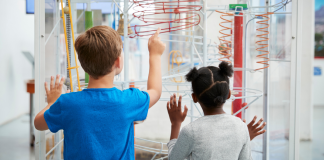 When I set out to write this post, I felt prepared and qualified. I got my masters degree in Library and Information Studies and my undergraduate degree is in Adolescent and Youth Development. I have heard numerous presentations on internet safety and other similar topics. I actually had to write a paper on the pornography industry at one point. So, I dove into this post thinking that little could surprise me. However, I failed to account for the fact that I was not yet a mom when I did all that research, heard those presentations, and completed those classes. After reacquainting myself with all of this information and getting up-to-date with all the new data out there, I came to one conclusion: I am scared of the Internet.
When I set out to write this post, I felt prepared and qualified. I got my masters degree in Library and Information Studies and my undergraduate degree is in Adolescent and Youth Development. I have heard numerous presentations on internet safety and other similar topics. I actually had to write a paper on the pornography industry at one point. So, I dove into this post thinking that little could surprise me. However, I failed to account for the fact that I was not yet a mom when I did all that research, heard those presentations, and completed those classes. After reacquainting myself with all of this information and getting up-to-date with all the new data out there, I came to one conclusion: I am scared of the Internet.
Numbers, Numbers, Everywhere
There are enough statistics on Internet use, screen time, and safety to make Sheldon Cooper’s head spin. So, instead of weighing you down with facts and figures, here are the Mommy Notes:
- Our children are spending a higher and higher percentage of time online each year.
- As technology develops, kids and teens have seemingly infinite methods to communicate.
- More modes of communication means more people to communicate with.
- If more people have the ability to communicate with our children, then there is a higher chance that someone with bad intentions will be able to contact them.
I still remember having a huge fight with my high school boyfriend when I originally created my Facebook profile. He was in college and he was very upset that Facebook had been opened to students not yet in college. I also remember my friends freaking out when their moms were allowed to create Facebook profiles for the first time! Now, social media is exponentially bigger than Facebook and growing all the time. The task of keeping up with the options available to our children is daunting. But, it is a task that we must take on with 150% effort.
Ignorance IS NOT Bliss
Chances are you have read articles explaining the dangers associated with apps like Musical.ly (now part of TikTok) and Snapchat. But, have you heard of BeeTalk, Whisper, WhatsApp, Spotafriend, or Flinch? How about Mappen, Fortnite, or Photomath? I had not heard of most of these apps until I researched this article, and 10 new ones have probably come on the market since I finished writing. So not only do we need to be aware of who our children communicate with across apps that we already use (Facebook, Instagram, etc.), but we need to be up-to-date on new apps that they may be using. The biggest issue with these apps is that they provide children with a method of communication that cannot be monitored. Unmonitored communication makes children vulnerable to predators and cyberbullies while also enabling them to be a bully without our knowledge.

Stranger Danger
I think the biggest fear of most parents, when it comes to the Internet, is that their children will fall victim to a child predator. But, that is not the only risk involved with young people surfing the net. Covenant Eyes (a fabulous resource) lists the top five dangers of Internet use as:
- Cyberbullying
- Online Predators
- Inappropriate Content
- Damaged Reputations
- Excessive Gaming

Be Careful Little Eyes What You See
So, how do we monitor each of our children’s devices, social media accounts, and gaming platforms all while remaining in tune with their experience rather than isolating them?
- Communicate boundaries from the get-go. If we give our children free reign and then try to pull them back, we are likely to encounter more resistance. Have a family meeting to explain the rules being implemented and the reasons behind them. Then, take time with each of your children to intentionally learn their needs and desires when it comes to the Internet.
- Explain that device/Internet use is a privilege and not a right. If they are not paying the WiFi bill for your home, then your kids do not have the right to set their own rules.
- Keep the computer(s) in a high-traffic area. This creates an environment of transparency.
- Consider purchasing a device like Circle with Disney. With Circle, you can monitor your children’s online time across multiple devices and use the built-in communication to explain what is and is not allowed. You can even reward your children with more screen time if they finish their homework/chores early, set a bedtime (I could use this for myself), and set a specific profile for each child with varying screen time and app allowances.
- Stay up-to-date on technology! Common Sense Media is a fantastic resource for this! Be sure to check out the section dedicated to parent concerns! NetSmartz is another great resource that has great infographics for communicating safety information to your kiddos.
- Communicate, communicate, communicate: Talk to your kiddos about what they like to do online. Ask them to show you the sites they like to visit, the games they like to play, and the apps they like to use. Genuine interest can open more doors than giving them the third degree.
So, am I really scared of the Internet? No. I am not scared of the Internet at its core. I do, however, have some concerns about the effects Internet use can have on my family and, specifically, my children. I think it is important to have a healthy awareness of the dangers out there so that we can adequately protect our children. This post is simply an overview; there is much more to read and learn about Internet safety.
Do you know what your children are doing online? What steps have you taken to encourage safe Internet use?











